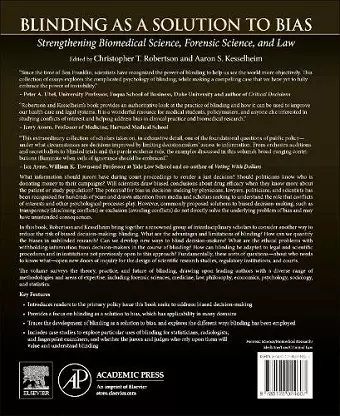Blinding as a Solution to Bias
Strengthening Biomedical Science, Forensic Science, and Law
Christopher T Robertson editor Aaron S Kesselheim editor
Format:Hardback
Publisher:Elsevier Science Publishing Co Inc
Published:2nd Feb '16
Currently unavailable, and unfortunately no date known when it will be back

An invaluable resource for biomedical scientists, forensic scientists, lawyers and policy makers
What information should jurors have during court proceedings to render a just decision? Should politicians know who is donating money to their campaigns? Will scientists draw biased conclusions about drug efficacy when they know more about the patient or study population? The potential for bias in decision-making by physicians, lawyers, politicians, and scientists has been recognized for hundreds of years and drawn attention from media and scholars seeking to understand the role that conflicts of interests and other psychological processes play. However, commonly proposed solutions to biased decision-making, such as transparency (disclosing conflicts) or exclusion (avoiding conflicts) do not directly solve the underlying problem of bias and may have unintended consequences. Robertson and Kesselheim bring together a renowned group of interdisciplinary scholars to consider another way to reduce the risk of biased decision-making: blinding. What are the advantages and limitations of blinding? How can we quantify the biases in unblinded research? Can we develop new ways to blind decision-makers? What are the ethical problems with withholding information from decision-makers in the course of blinding? How can blinding be adapted to legal and scientific procedures and in institutions not previously open to this approach? Fundamentally, these sorts of questions—about who needs to know what—open new doors of inquiry for the design of scientific research studies, regulatory institutions, and courts. The volume surveys the theory, practice, and future of blinding, drawing upon leading authors with a diverse range of methodologies and areas of expertise, including forensic sciences, medicine, law, philosophy, economics, psychology, sociology, and statistics.
"Since the time of Ben Franklin, scientists have recognized the power of blinding to help us see the world more objectively. This collection of essays explores the complicated psychology of blinding, while making a compelling case that we have yet to fully embrace the power of invisibility." --Peter A. Ubel, University Professor, Fuqua School of Business, Duke University "Robertson and Kesselheim’s book provides an authoritative look at the practice of blinding and how it can be used to improve our health care and legal systems. It is a wonderful resource for medical students, policymakers, and anyone else interested in studying conflicts of interest and helping address bias in clinical practice and biomedical research." --Jerry Avorn, Professor of Medicine, Harvard Medical School "This extraordinary collection of scholars takes on in exhaustive detail one of the foundational questions of public policy – under what circumstances are decisions improved by limiting decisionmakers’ access to information. From orchestra auditions and secret ballots to blinded trials and the parole evidence rule, the examples discussed in in this volume’s broad-ranging contributions illuminate when veils of ignorance should be embraced." --Ian Ayres, Professor, Yale Law School
ISBN: 9780128024607
Dimensions: unknown
Weight: 1040g
388 pages